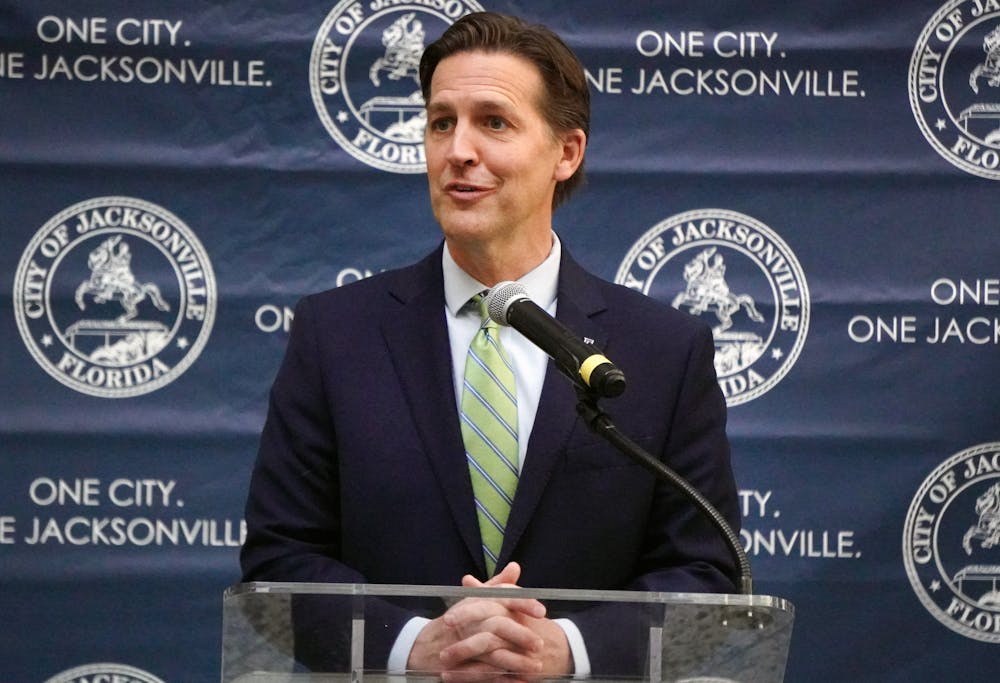UF President Ben Sasse described an early framework of UF’s new strategic plan in faculty-only presentations across UF’s colleges last week.
The presentation was summarized by attendees who spoke anonymously to The Alligator because they feared repercussions from disclosing details of the president's remarks.
Sasse discussed adjusting student tuition costs, reducing the total number of academic departments, eliminating "quiet-retired" faculty and restructuring the delivery of education, a professor said.
“Sasse predicted that low tuition costs, which are heavily subsidized by the Legislature's appropriations that include lucrative Bright Futures scholarships for many students, can't continue,” one professor wrote.
Sasse described low tuition costs as radically underpriced and "an economic model that doesn't make sense."
"We are the only state that loses money on every student," Sasse said. "We should definitely be charging ability-to-pay for children of the wealthiest."
Sasse does not have the ability to dictate state legislation regarding subsidized tuition or the Bright Futures scholarship program as UF president, according to state law.
Sasse also indicated that the total number of academic departments at UF need to be reduced. There are currently 199 academic departments across UF’s 16 colleges.
“[Sasse] indicated an ideal number would be far fewer, such as 140, which would be a 30% decrease,” one professor wrote.
Sasse also criticized professors who fail to obtain outside research money. Many of these professors teach only one or two classes each semester, he said.
In one college he did not identify, 13 research professors were employed without any current research projects, Sasse said.
"Most of our research dollars come from 84 professors," Sasse said. "Too many people are nominally on a research track but not doing research."
Only 10% of research faculty drove 39% of research awards on campus, Sasse said.
Mike Foley, a UF journalism professor, asked Sasse if state legislation affected campus hiring efforts at a College of Journalism and Communications presentation Aug. 18.
Foley cited recent reporting by the Tampa Bay Times which documented cases of faculty departing Florida universities and prospective hires who were leery of coming to the state.
“He said that he's checked the figures and people are not leaving at any rate other than normal,” Foley said. “I was nervous asking a question because nobody else was asking [questions].”
Sasse also said UF needs to rethink its delivery of education to students.
“Sasse distinguished remote teaching from asynchronous lectures where students passively watch professors on pre-recorded video, which are unpopular for many students,” one professor wrote. “He said new models would disrupt traditional notions of place-and-time teaching, where faculty meet virtually with students at the same time but not necessarily in the same location.”
Revamping education delivery would have wide-ranging positive effects, Sasse said.
“He said that could broaden UF's appeal among students across Florida's 67 counties and help solve challenges recruiting top professors to move to Gainesville,” one professor said.
Technology companies will take over if UF doesn’t innovate its delivery of education, Sasse said. He noted that UF's touted HiPerGator high-performance computing isn't being used to its capacity.
"Tech companies will figure out how to deliver education better, more quickly," he said.
Sasse also presented “sobriety data” that demonstrated UF was not as successful as it is sometimes perceived.
“He said UF's heralded Top 5 ranking by US News & World Report among public institutions is more meaningfully regarded as No. 29 in the U.S. because there is no importance between publicly and privately funded universities,” one source wrote.
Sasse said he is skeptical of rankings.
He also said some of UF's successes, such as its high standards for enrollment, happened by chance.
"If we end up on third base, we shouldn't confuse this with hitting a triple," Sasse said.
Sasse showed slides a screen during his presentations were marked "preliminary," "pre-decisional" and "deliberative" which could preclude them from being released under Florida's public records laws, one professor noted.
Sasse said he plans on piloting his goals in Fall 2024 and fully implement them in Spring 2025, one source said.
Sasse is expected to reveal more details of his strategic plan this semester.
Contact Garrett at gshanley@alligator.org. Follow him on Twitter @garrettshanley.
Garrett Shanley is a fourth-year journalism major and the Spring 2025 university editor for The Alligator. Outside of the newsroom, you can find him watching Wong Kar-Wai movies and talking to his house plants.






